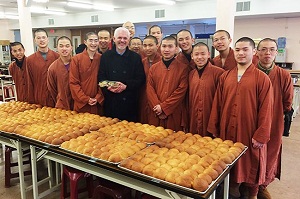"The most exalted task is worthless if performed with arrogance. The most menial task is invaluable if performed with humility and love. Therefore the base of service must be the actual practice of Dhamma in order to ensure the proper results. ...
"... No one serving Dhamma should feel superior or inferior to others. Whatever the task assigned, one should accept it happily as an opportunity to serve for the benefit of many, to bring a smile to faces that were tearful, to foster peace where before there was none.
"We serve merely for the sake of serving, without expecting anything in return. And the result will be to create an atmosphere of love, good-will and purity, which will help those who come now, and in later generations, to grasp the Dhamma and find real peace.
"Therefore, Dhamma service is an extraordinary opportunity. Perform it to liberate yourselves and to help others be liberated from defilements, from bondages, from misery. Be the torchbearers of the Dhamma to dispel the surrounding darkness of ignorance and suffering."


 << For several years, Tsomo taught weekly classes in Missoula on meditation. Tsomo calls meditation a bridge between the brain’s amygdala, which controls reflexive or instinctual reactions, and the more complex parts that hold our personalities and memories. TOMMY MARTINO, Missoulian
<< For several years, Tsomo taught weekly classes in Missoula on meditation. Tsomo calls meditation a bridge between the brain’s amygdala, which controls reflexive or instinctual reactions, and the more complex parts that hold our personalities and memories. TOMMY MARTINO, Missoulian










